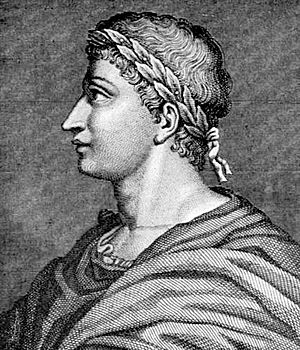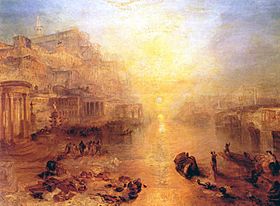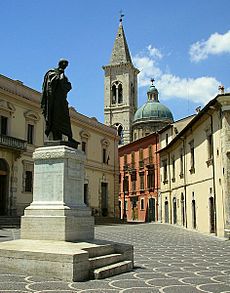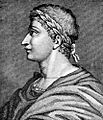Publius Ovidius Naso facts for kids
Quick facts for kids
Ovid
|
|
|---|---|
 |
|
| Born | Publius Ovidius Naso 20 March 43 BC Sulmo, Italy, Roman Republic |
| Died | 17 or 18 AD (age 59–61) Tomis, Scythia Minor, Roman Empire |
| Occupation | Poet |
| Genre | Elegy, epic, drama |
| Notable works | Metamorphoses |
Publius Ovidius Naso (born March 20, 43 BC – died 17 or 18 AD), known as Ovid, was a famous Roman poet. He lived during the time of Augustus, who was the first Roman Emperor. Ovid was a friend and colleague of other great Roman poets like Virgil and Horace. People often consider them the three most important poets of Latin literature.
Ovid was very popular during his life. However, Emperor Augustus sent him away to a faraway place called Tomis. This town was on the Black Sea coast. Ovid stayed there for about ten years until he died.
Contents
Ovid's Life and Works
Ovid was one of the first major Roman poets to start his career when Augustus was in charge. He was a bit younger than Virgil and Horace. These three poets are seen as the most important writers of Latin literature. A Roman scholar named Quintilian called Ovid the last of the Latin "love elegists." This means he wrote poems about love and feelings.
Ovid was very well-liked during his lifetime. But Emperor Augustus sent him to a distant area near the Black Sea. Ovid stayed there until he died. He said his exile was due to "a poem and a mistake." He never fully explained what the mistake was. This has led to many guesses over the years.
Today, Ovid is most famous for his long poem called Metamorphoses. This poem tells many stories from Greek and Roman myths. It describes how different things and people change into new forms. He also wrote other important works like Ars Amatoria (which means "The Art of Love") and Fasti.
Ovid's poetry was copied and admired for many centuries. It had a huge impact on Western art and literature. The Metamorphoses is still a key source for learning about classical mythology today.
Ovid's Early Life and Family
Ovid wrote more about his own life than most other Roman poets. We learn about him mostly from his poems. One poem, Tristia 4.10, shares many details about his life. Other writers like Seneca the Elder also mentioned him.
Ovid was born in Sulmo (now Sulmona, Italy). His family was important and wealthy. He was born on March 20, 43 BC. Ovid and his brother studied public speaking in Rome. His father wanted him to become a lawyer. But Ovid was more interested in feelings and stories than arguments.
After his brother died at age 20, Ovid decided not to become a lawyer. He traveled to places like Athens, Asia Minor, and Sicily. He held a few small public jobs, but he soon left them to become a poet. His father was not happy with this choice.
Ovid gave his first public poetry reading around 25 BC, when he was eighteen. He became part of a group of writers led by a famous patron named Marcus Valerius Messalla Corvinus. He was also friends with poets like Propertius and Horace. He only briefly met Virgil and Tibullus, but he admired their work.
Ovid married three times and divorced twice by the time he was thirty. He had one daughter and some grandchildren through her. His last wife was from an important family. She helped him during his time in exile.
Ovid's Literary Achievements
For the first 25 years of his writing career, Ovid mainly wrote poems about love and feelings. It's hard to know the exact order of his early works. His earliest surviving work is probably the Heroides. These are letters from famous mythological heroines to their absent lovers.
His collection of love poems, Amores, was first published around 16–15 BC. The version we have today was shortened to three books. Ovid also wrote a play called Medea, which was admired in his time but is now lost.
Ovid's poem Medicamina Faciei was about women's beauty treatments. This came before his famous Ars Amatoria (The Art of Love), published around 2 AD. Ovid later hinted that this poem was one reason for his exile. He followed this with Remedia Amoris (Remedies for Love) in the same year. These poems made Ovid one of the most important Roman poets of his time.
By 8 AD, Ovid had finished Metamorphoses, his most ambitious work. This long poem has 15 books. It tells stories from Greek and Roman mythology. It describes how beings transform into new forms. For example, people change into trees, rocks, animals, or stars. At the same time, he was working on Fasti. This poem was about the Roman calendar and its festivals. Ovid's exile stopped him from finishing this poem.
Ovid's Exile to Tomis
In 8 AD, Emperor Augustus sent Ovid away to Tomis. This was a town on the Black Sea. This event changed all of Ovid's later poetry. Ovid wrote that the reason for his exile was "a poem and a mistake." He said his "crime" was very serious.
Around the same time, the Emperor's grandchildren were also sent away. One of them, Lucius Aemilius Paullus, was put to death for plotting against Augustus. Ovid might have known something about this plot.

While in exile, Ovid wrote two collections of poems. These were called Tristia and Epistulae ex Ponto. They showed his sadness and loneliness. He was far from Rome and had no access to libraries. This might be why he couldn't finish his Fasti poem. Only the first six books of Fasti exist.
Ovid learned some local languages, like Sarmatian. The five books of Tristia were written between 9 and 12 AD. These poems expressed his sadness and asked to return to Rome. The Epistulae ex Ponto were letters to friends in Rome. He asked them to help him come back. These are thought to be his last poems.
His exile poems are very emotional and personal. In Epistulae, he said he became friends with the people of Tomis. He even claimed to have written a poem in their language. But he still missed Rome very much. He wrote many poems to his third wife, to Emperor Augustus, and to his friends. He expressed his loneliness and his hope of returning home.
The exact reasons for Ovid's exile are still a mystery. Medieval texts that mention it don't give clear answers. Ovid himself gave hints that were often unclear or seemed to contradict each other. Most scholars believe Ovid was truly exiled. It would have been very unusual for him to leave his important poem Fasti unfinished if he hadn't been forced to.
Ovid's Death
Ovid died in Tomis in 17 or 18 AD. It is believed that his poem Fasti, which he was still working on, was published after his death.
See also
 In Spanish: Ovidio para niños
In Spanish: Ovidio para niños
Images for kids
 | Shirley Ann Jackson |
 | Garett Morgan |
 | J. Ernest Wilkins Jr. |
 | Elijah McCoy |



